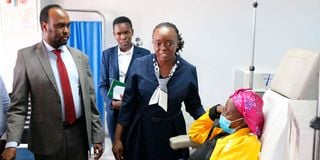Over 1,500 private hospitals listed with SHA, Health CS Deborah Barasa says

Health Cabinet Secretary Deborah Barasa talks to a kidney patient at Sublime Healthcare in Nakuru Town on October 7, 2024.
On October 3, 76-year-old James Kanyore, a renal patient, went viral after he was captured in tears after he was turned away from his regular dialysis session at a private hospital in Nakuru City.
For the past year, Kanyore had been relying on his NHIF card to cover dialysis costs but the recent transition to the Social Health Authority (SHA) left him unexpectedly required to pay Sh9,500 out of pocket.
Kanyore who was accompanied by his wife was shocked by the demand for cash and unable to afford the immediate payment, the elderly man returned home without receiving treatment.
The family which relies on their livestock for income had to sell two goats—their main source of livelihood to pay for future sessions.
“On that day they told me to go home and ask my family for money. I am not employed. I just went home in pain not knowing what to do. But we had to find an alternative because I cannot go without dialysis,” Kanyore said, recalling the difficult moment.
His story attracted the attention of Health Cabinet Secretary Dr Deborah Barasa who on Monday swiftly visited Nakuru hospitals to evaluate the SHA’s rollout and ensure patients like Kanyore were receiving necessary care.
During her visit, Dr Barasa assured dialysis patients that they would continue receiving services even in private hospitals as the government was in the process of signing agreements with the facilities.
"We are happy to report that our mzee is now undergoing dialysis and has been successfully registered under SHA. All patients undergoing dialysis at this unit are now covered under the new system," Dr Barasa said.
The CS later confirmed that over 1,500 private hospitals had already contracted with SHA and the government expected 90 percent of facilities to be fully onboarded within days.
She emphasised that patients should not be turned away for lack of payment during the transition urging healthcare providers to offer services and submit claims for reimbursement afterward.
The minister assured the public that any patients who had paid medical expenses out of their own pockets due to the transition glitches would be reimbursed.
Dr Barasa underscored that the SHA programme would ensure that critical treatments like dialysis, cancer care, and maternity services are accessible to all Kenyans without undue delays or additional financial burden.
“E-contracting is ongoing, we have been in communication with doctors in Kenya Renal Association and we will continue with the engagement when it comes to matters renal disease among patients. We are engaging with them and E-contracting is ongoing. All public facilities are onboard and patients can access services, in the private facilities we are still receiving contracts by tomorrow we believe 90 percent should have contracted,” she said.
However, despite the government's efforts, the transition hasn’t been seamless for everyone.
On Monday (October 7), George Ndu'ngu, another dialysis patient in Nakuru, missed two vital dialysis sessions due to a system failure in updating patient data under the new SHA.
Mr Ndu'ngu, who has been battling kidney failure for three years, was turned away from his scheduled treatment when the hospital’s portal collapsed, leaving him without the critical care he needs to survive.
“I went for dialysis, but the system was down. They could not attend to me, and now I’m too weak to even walk properly. My condition has worsened, and I’ve been unable to work, leaving me in a very vulnerable state,” he lamented.
Mr Ndu'ngu’s family tried to get help directly from Dr Barasa during her visit to Nakuru but despite her presence in the county, his case was not addressed.
The SHA rollout is meant to streamline healthcare services by providing a unified system for medical coverage across public and private facilities. However, the transition has faced technical challenges, including delays in registering patients and processing claims, which has caused disruptions in care for many.
“I'm appealing to the government to step in. We can't afford to lose more lives because of system failures. I do not know where to start from here. I do not have money to attend my sessions," he said.
DR Barasa acknowledged these early-stage difficulties.
“We had system challenges at the beginning, but we are gradually addressing them. That’s why we’re here to evaluate and ensure implementation is moving forward smoothly. We want to assure Kenyans that services will be available to them,” the CS said.
She promised continued engagement with healthcare providers, including the Kenya Renal Association, to address concerns related to renal care and other chronic diseases under SHA.





